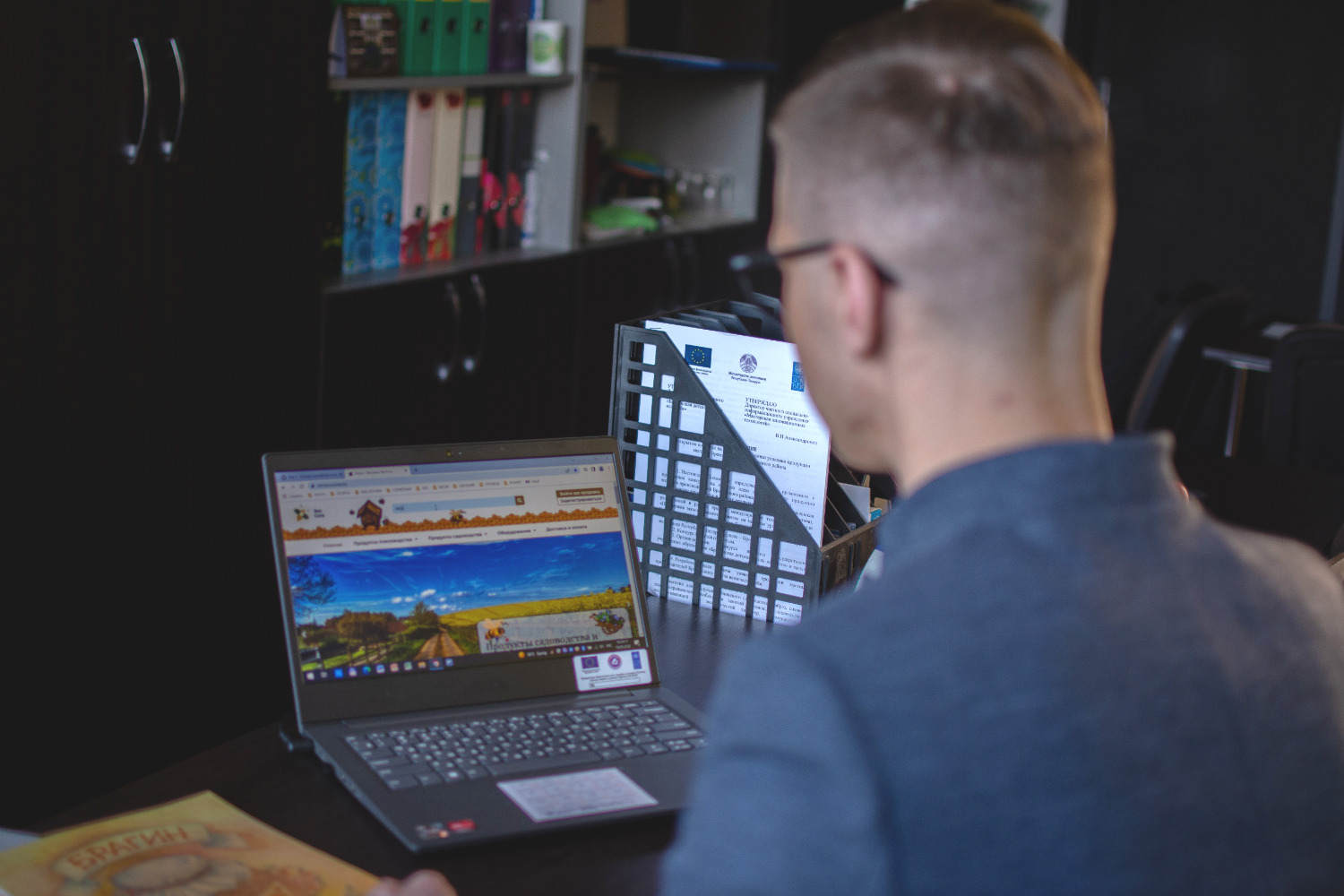UNDP in Belarus works to ensure that benefits of digital transformation become affordable, available and accessible to all people, empowering them and improving their well-being.
Leveraging Human-Focused Digital Development for Belarus
June 16, 2022

A woman gives online knitting class during the COVID-19 pandemic.
The COVID-19 pandemic demonstrated the urgency to strengthen digital transformation and digital inclusion. Our report on COVID-19 and Human Development clearly articulates that internet connectivity and accessible digital services are key enablers for sustainable development.

Belarus is well-positioned to pursue this digital transformation, with cellular telecommunication networks covering 99% of its territory and 85% of the country’s population being Internet users.
However, the technology is unevenly distributed: 89% of Belarusians living in cities and 73% of people in rural regions use internet and digital services. The State Programme “Digital Development of Belarus 2021-2025” recognizes increasing connectivity and raising peoples’ digital skills as indispensable pillars of a successful digital transformation.
These priorities are at the heart of UNDP’s digital strategy in Belarus, which works to ensure that benefits of digital transformation become affordable, available and accessible to all people, empowering them and improving their well-being.
UNDP in Belarus presented 18 digital solutions for development at the IT Forum "TIBO-2022", Minsk.
In 2021, UNDP together with local, national and international partners supported 53 people-focused solutions for local economic development and entrepreneurship, smart and green urban development, ecotourism and nature protection to help:
- reduce disparities in living standards for local and rural communities by ensuring access to products and services;
- promote local unique value propositions to attract customers and investors;
- capacitate local initiatives for scaling-up and attracting investments in the regions;
- develop and enlarge local business communities in the regions;
- improve data collection and management for urban administrations.

COVID-19 demonstrated that the demand for digital skills among entrepreneurs is greater than before the pandemic.
Digital transformation can also offer private companies, especially SMEs, easier access to strategic resources, helping them reach a wider customer base and integrate more easily in new markets, and enabling them to capitalize on network effects. Our Guidelines on SMEs Digitalization offered practical advice on how digital technologies can increase business’ efficiency.
With EU financing, we also work with the Ministry of Economy to support small and medium-sized entrepreneurs through digital platforms facilitating business community building, networking, education opportunities and consultancies in regional towns and rural areas across 12 Belarusian districts.

The online platform “EcoSota” helped local farmers improve their marketing services and increase the production of honey, beekeeping and horticultural products by 3.5 times.
For example, the online platform “EcoSota” helped local farmers improve their marketing services and increase the production of honey, beekeeping and horticultural products by 3.5 times. The number of people enrolled in educational courses on gardening and beekeeping also increased from 20 to 319 participants.
Other digital solutions developed within the project support better digital presence of local producers and craftsmen, promote their products and services; encourage customers to buy locally; simplify access to rental market, bring franchises to Belarus’ districts; facilitate access to improved social and health services for the local communities.
Digital solutions provide new opportunities for positioning the unique Belarusian nature, encouraging ecotourism development and the conservation of biodiversity in protected natural areas. Harnessing the power of immersive technology, an ecotourism project, implemented by UNDP in partnership with the Ministry of Natural Resources and Environmental Protection , helped three Belarusian nature reserves – “Nalibokski”, “Aziory” and “Asviejski” – develop virtual tours.

A bird's view of Ozery Nature Reserve, Hrodna region, Belarus
More than 100 aerial and 3D photography takes tourists to a breathtaking virtual journey across the reserves’ autumn and winter landscapes. Starting from December 2021 around 5,000 people saw the nature beauties of the reserves via the virtual tours.
In 2021, the UNDP Accelerator Lab applied digital thinking to a portfolio of experiments testing solutions for the implementation of the “smart cities” initiative in Belarus. In Navahrudak, the AccLab encouraged responsible consumption of water and energy among residents of multifamily dwellings though leveraging smart energy measurement solutions and creative household-tailored information campaign. In Pinsk, Navahrudak , Navapolatsk and Korma, the AccLab piloted solid municipal waste scheme applying ultrasonic sensors and encouraged people to take the initiative in monitoring and expanding green areas in their cities using a mobile app. Partnerships with the local authorities, the Ministry of Housing and Utilities and the Ministry of Communications and Informatization of Belarus will now be leveraged to scale-up these initiatives.
Digital technologies are not one-size-fits-all solutions. Much depends on how digital ecosystems are designed, managed and executed. Safe, affordable, and meaningful digital services and products for all can make a huge difference to complement the achievement of national development priorities. Through its projects, local initiatives and innovative pilots, UNDP continues to support Belarus in developing inclusive and efficient digital ecosystem, placing equality and human development at the heart of its digital work and partnerships.

 Locations
Locations